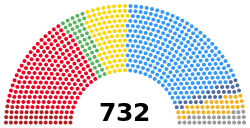| |||||||||||||||||||||||||||||||||||||||||||||||||||||||||||||||||||||||||
All 732 seats to the European Parliament 367 seats needed for a majority | |||||||||||||||||||||||||||||||||||||||||||||||||||||||||||||||||||||||||
|---|---|---|---|---|---|---|---|---|---|---|---|---|---|---|---|---|---|---|---|---|---|---|---|---|---|---|---|---|---|---|---|---|---|---|---|---|---|---|---|---|---|---|---|---|---|---|---|---|---|---|---|---|---|---|---|---|---|---|---|---|---|---|---|---|---|---|---|---|---|---|---|---|---|
| Turnout | 45.47% [1] | ||||||||||||||||||||||||||||||||||||||||||||||||||||||||||||||||||||||||
| |||||||||||||||||||||||||||||||||||||||||||||||||||||||||||||||||||||||||
 Post-election composition of each member state's delegation | |||||||||||||||||||||||||||||||||||||||||||||||||||||||||||||||||||||||||
| |||||||||||||||||||||||||||||||||||||||||||||||||||||||||||||||||||||||||
| This article is part of a series on |
 |
|---|
The 2004 European Parliament election was held between 10 and 13 June 2004 in the 25 member states of the European Union, using varying election days according to local custom. The European Parliamental parties could not be voted for, but elected national parties aggregated in European Parliamental parties after the elections.
Contents
- Results
- Statistics
- Results by country
- Results by EU party (2004 estimated result)
- Results by EU party (2007 notional result)
- New parties in the 2004 election
- New inclusion
- Political group reshuffle after the 2004 election
- See also
- Concurrent elections
- References
- External links
- Results 2
- European Election information sites
- Candidates
Votes were counted as the polls closed, but results were not announced until 13 and 14 June so results from one country would not influence voters in another where polls were still open; however, the Netherlands, voting on Thursday 10, announced nearly complete provisional results as soon as they were counted, on the evening of its election day, a move heavily criticized by the European Commission.
342 million people were eligible to vote, the second-largest democratic electorate in the world after India. It was the biggest transnational direct election in history, and the 10 new member states elected MEPs for the first time. The new (6th) Parliament consisted of 732 Members of the European Parliament (MEPs).
Results showed a general defeat of governing parties and an increase in representatives from eurosceptic parties. No majority was achieved. The balance of power in the Parliament remained the same (largest party EPP-ED, second largest PES) despite the 10 new member states.
Following the 2004 enlargement of the European Union which was finalized on 1 May 2004, this was the first European Parliament election to be held in Cyprus, the Czech Republic, Estonia, Hungary, Latvia, Lithuania, Malta, Poland, Slovakia, and Slovenia.













